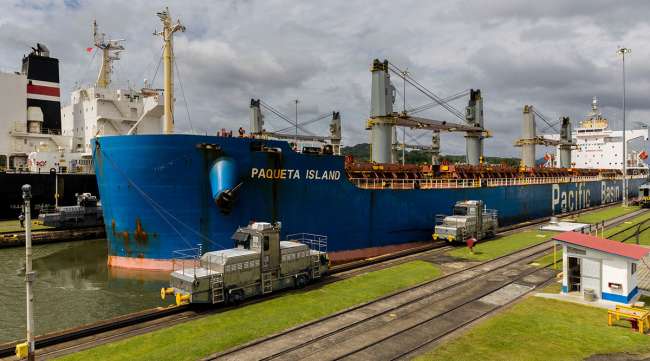The Paqueta Island bulk carrier navigates through the Miraflores locks of the Panama Canal near Panama City, Panama, on Dec. 23, 2024. (Tarina Rodriguez/Bloomberg News)
Danish shipping powerhouse A.P. Moller-Maersk A/S purchased a railway linking ports at both ends of the Panama Canal, undermining the United States’ presence along a key trade route where Donald Trump is trying to elbow out competitors.
Maersk’s port operator, APM Terminals, acquired the Panama Canal Railway Co., the owner of the line that stretches across the isthmus nation, from a joint venture between Canadian Pacific Kansas City and the U.S.’s Lanco Group. Maersk ranks No. 6 on the Transport Topics Top 50 list of the largest global freight carriers.
“The sale of this noncore asset creates value for our shareholders and reflects our commitment to optimize our assets as we focus on growing our core North American rail business through our rivaled three-nation network connecting Canada, the U.S. and Mexico,” CPKC CEO Keith Creel said in a statement.
The Calgary-based company, which operates routes across North America, didn’t disclose how much it received for the sale of the 47-mile (76-km) railway running along the waterway that links the Atlantic to the Pacific Ocean.
For months, Trump has railed against encroaching Chinese influence of the Panama Canal, which the U.S. built last century and then ceded control over nearly three decades ago. The Republican president insists the handover was a bad deal and has threatened to “take back” the waterway.
Panama’s government declined to comment on a private transaction not related to operations of the canal.
In March, BlackRock Inc. led an acquisition of two ports on either side of the Panama Canal from Hong Kong’s CK Hutchison for a $19 billion cash deal. Beijing bristled at the sale, which now may be delayed.
The railway “represents an attractive infrastructure investment in the region aligned to our core services of intermodal container movement,” APM Terminals CEO Keith Svendsen said.






